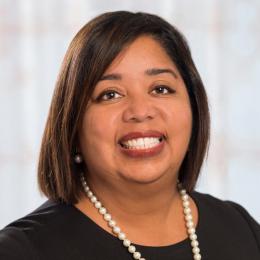It is often said that there is “no single right or wrong answer” when responding to most situations, so choose the one that feels authentic and right for you. Our individual life experiences and perspectives shape how we show up both personally and professionally. When it comes to responding to a global pandemic — while simultaneously dealing with the social unrest and global outrage following George Floyd’s killing — business leaders have had to make hard decisions about how they respond.
One decision most had to make was whether to make a formal statement supporting racial justice reform. These types of decisions are never made in a vacuum; there are many variables to be considered, most importantly, one’s personal values. In the end, ACC decided to make a statement following the death of George Floyd and to focus on more than just a statement. ACC chose to focus on helping to address problems and offer ideas for solutions. As a leader of a global organization, it was important for me to reach out to the legal community to open a dialogue and identify tangible ways we can help. I also felt it was important for ACC’s staff to be offered a safe space to have the same discussions. Leading and dealing with my own very personal experience to this tragedy has been challenging to say the least.
When it comes to COVID-19, while we are all facing the same pandemic, we are each experiencing it very differently — from various locations, situations, and mindsets. There can be no single way, no right or wrong way, when it comes to responding to a crisis of this magnitude. That said, any experts who profess to have all the answers or offer a leadership checklist for these times ring false to me.
What I know to be true is that no modern leader has faced a challenge like COVID-19 (not to mention doing so during perhaps the most socially charged time in modern history). A challenge that is so pervasive that it’s impacting the physical health, mental well-being, safety and security, and basic humanity of every person on the planet — while at the same time wreaking havoc on the financial and economic stability of every nation, town, city, neighborhood, and household. But even as we focus on the big tasks at hand, leaders must keep an eye trained on what might be coming next: What should we be anticipating today to land us in the best possible place tomorrow? What is the strategy needed to close that gap, and how and through whom will we get the job done? How will we remain agile?
ACC is in the service business. The ability to serve rests on the strength of the relationships forged with our members and sponsors over time.
What I’ve learned (and am still learning) …
As a leader, I have deep knowledge of ACC, the in-house counsel community, and beliefs about what it takes to remain relevant in the very competitive professional services sector. That clarity helps guide my ability to set and communicate priorities, and it also makes decisions that much easier. First and foremost, I try to remain mindful of “who” and “how” we serve. ACC is in the service business. The ability to serve rests on the strength of the relationships and trust forged with our members and sponsors over time. ACC’s dedicated employees are the glue and foundation that keep ACC running so effectively. As a result, when the gravity of the pandemic was unfolding, my commitment was, and remains, the safety and protection of ACC staff.
Based on guidance from global health organizations, the ACC team has been working-from-home since mid-March, and our offices will remain closed until health experts and scientific data indicate the ability to reopen our global offices safely. We are grateful that ACC’s business model and technology investments have facilitated the ability to work from home with relatively little disruption to how well we work together.
Yet as a leader, I have found that regardless of one’s own situation, it’s critical to bring a sense of empathy for others. That understanding tone will resonate through an organization to become part of its culture. We know there are greater challenges looming and the road to the other side will not be easily navigated. In fact, many CEOs and leaders have made painful decisions to reduce their workforces. The economic hardships imposed by COVID-19 are causing many businesses to fold. For the ACC team, our priorities are clear: We will do all we can to offer kindness and support to members who find themselves displaced or in transition. These members will need the ACC network now more than ever to find their way to that next opportunity. We are committed to being there for our members.
While we are all figuring this thing out as we go, I try to be mindful that our teams are also looking to us for guidance. So, I am doing my best to lead by example: To try not to expect more of anyone else than I am willing to give of myself and hope that our collective levels of engagement, optimism, and dedication enable us to dig just a little bit deeper to achieve the stretch results we’ll need this year.
Too many voices
Everyone has an opinion about what it takes to be a “good” leader. If you try to follow all the advice that is offered, or listen too closely to the many self-proclaimed experts, you will likely fail. In the wake of this pandemic, you may have noticed several “fast experts” on leading during a crisis. There are all kinds of articles, checklists, do’s and don’ts, top 10 traits, and the like to choose from.
I am not suggesting that there is nothing to gain from this content. In fact, there are often nuggets of real wisdom in the practices that have worked for others. In my recent “Views with Veta” article, for example, I shared my personal approach to practicing self-care.
While I do hope you found something I offered to be helpful, I am in no way an expert — I simply shared what works for me. So while I shy away from those who claim to be experts in leadership, or who may claim this is the right or wrong way to lead, I do encourage you to share and seek out your networks, colleagues, and, yes, trained professionals to help identify the best practices that will work for you.
Leadership, however, is personal. We all lead from different strengths, and hopefully turn to our colleagues and coworkers for help in areas where we may be weaker. I do believe that good leaders surround themselves with good people and smart leaders listen to what they have to say. But when it is time for a decision to be made, I have had to learn to summon my confidence to make those calls. And although getting to the other side of this crisis may prove to be a marathon and not a sprint, if you overthink or snooze, you may lose. So being fearless helps prevent indecisiveness.
In the end …
I do not like to spend a lot of time “in my own head,” thinking about the leadership traits I may possess or lack, and I would prefer to leave others to judge me by my actions and results.
Ultimately, my view of leadership during COVID-19 as well as during times of social unrest mirrors my view on leadership in general — leadership entails clarity and communication of vision, confidence mixed with equal parts of fearlessness and humility, self-care to face the mental and physical demands, and empathy while keeping the needs of the people you work with at the forefront.
We all need to pace ourselves to meet all the demands that come with being in a leadership role, especially during a time like this. Take care of yourself and those who work with and for you. I have also found that a little lipstick and a smile can go a long way especially on so many video calls, so I keep both in abundance!
How are you facing the challenges of the day? How have your previous experiences shaped you as a leader? I would love to hear your thoughts! Please share them with your in-house community!
Be well,
Veta
For more of Veta’s leadership lessons, visit acc.com/views-with-veta.




